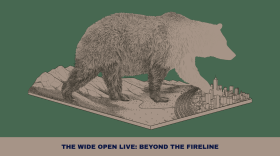
Nick Mott
Reporter & ProducerNick Mott is a reporter and podcast producer based in Livingston, Montana.
-
Pencils down! Does that phrase bring back some anxiety-inducing memories? What if, like in your bad dreams, it's an exam you haven't studied for? A listener wants to know why student test scores have stopped rising. The answer involves triangles and time. Learn more in this lesson of The Big Why. There won't be a quiz afterward.
-
Elk are a familiar sight in much of Montana now, but that hasn't always been the case. By the early 1900s, unregulated hunting had led to massive declines in wildlife nationwide. But In Yellowstone, elk populations were exploding thanks to protections in place there. The solution to restoring elk outside the park seemed obvious. Less obvious was how to make it happen. This week on the Big Why, we trace the animals' bumpy path from the living laboratory called Yellowstone Park to the Bitterroot Valley and beyond.
-
The state Board of Housing Wednesday announced nearly $40 million in federal tax benefits to build or rehabilitate affordable homes; The Montana Fish and Wildlife Commission will hold its biannual season-setting meeting for big game species from elk to bison to mountain lions on December 4; Billings has a new representative in the state Legislature.
-
In Montana, abortion access has been at times illegal, legal, and stuck in limbo. Providers have weathered bombings and arson, advocates and opponents have battled it out in court, and citizens have passed a constitutional amendment affirming a woman's right to choose. One listener wants to know more about the history of reproductive rights in Montana. MTPR's Aaron Bolton reports on the underground networks, political violence and landmark court cases that got us to where we are today.
-
Wolves are among Yellowstone's most popular sights – so popular and so closely watched they can become accustomed to seeing people. But when wolves leave the park, that familiarity can turn deadly for them. MTPR's Elinor Smith spoke with Nick Mott, who dug into what happens when the animals cross park boundaries.
-
Mine workers sue Sibanye Stillwater over alleged labor law violations; National park entrance fees to increase by hundreds of dollars for foreign tourists; Missoula County reports its first flu-related death of the season.
-
This week on The Big Why, we’re exploring Montana’s 56 counties. A listener from Billings wants to know how they got their shapes. Finding the answer led MTPR's Austin Amestoy down a rabbit hole where he found a saga of boom and bust, backroom dealing and an unlikely folk hero.
-
This week, we shift gears to examine another thorny environmental issue in the West: Wildfire. Fires are getting bigger and more destructive, and as part of the ecosystem, they're not going away. Listen in as four wildfire experts discuss the issue at the Free Press Fest in Bozeman.
-
Montana’s frontier days were stuffed with gold, greed and political corruption — and all three played a part in drawing the state’s western boundary with Idaho. A listener wants to know how that squiggly line came to be. Find out now on The Big Why.
-
State wildlife officials will take up a proposal Thursday to overhaul hunting regulations in order to reduce wolf numbers statewide. But locals near Yellowstone National Park say the proposal would impact the region’s vulnerable wolf population and the economy built around it.









